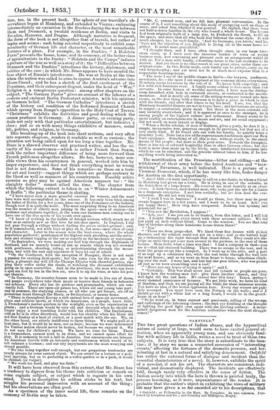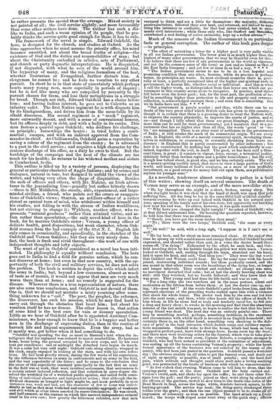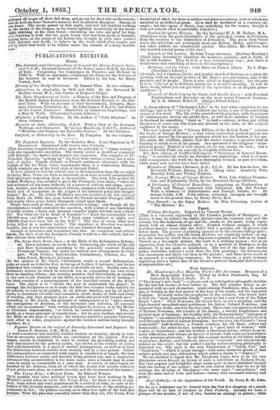OAKFIELD. * THE two great questions of Indian abuses, and the
hypocritical nature of society at large, would seem to have excited general at- tention, when an apparently young man, and one obviously fami- liar with military life in India, writes a novel to treat of those two subjects. It is very true that the story is subordinate to the trea- tise; if by story we mean a connected succession of "interesting events," affecting the fortunes of the dramatis personte, and ter- minating at last in a natural and satisfying denouement. Oakfteld has rather the external forms of dialogue and incident than the essential characteristics of a novel. It, however, ex.hibits the spirit of a novelist, if not his art. The characters are consistent, indi- vidual, and dramatically displayed. The incidents are effectively told, though rarely very effective in the tense of fiction. The Indian society into which the hero is thrown is painted truly, the persons becoming, as it were, acquaintances of the reader. It is probable that the author's object in exhibiting the vices:vat military life may have given a so far onesided air to his descriptions, that • Oakfield; or Fellowship in the East. By Punjabee. In two volumes. Pub- lished by Longman and Co.; and Crossley and BiLlington, Rugby. he rather presents the special than the average. Mited society is not painted at all ; the civil service slightly. and more favourably than some other writers have done. The author has such a dis- like to India, and such a mean opinion of its people, that he pro- bably thinks the service quite good enough for those it has to rule. The framework of the novel is simple, Edward Oakfield, the hero, is designed for the church, and studies at Oxford. As the time approaches when he must assume the priestly office, his mind becomes unsettled, not about the broad truths of religion—the existence of God and the duties and responsibilities of man; but about the Christianity embodied in articles, acts of Parliament, and church or party dogmatic interpretations. He is disquieted, if not disgusted with what he sees of the world ,around him. The hypocrisy of many, and the religious formalism of the best, whether Tractarian or Evangelical, further disturb him. A clergyman he cannot be ; and he feels no vocation to any other pursuit. In short he is in that state of uncertainty which perhaps besets many young men, more especially in periods of inquiry ; but he is not like many who are compelled by necessity to the pursuit chosen for them, and lose their metaphysics in a struggle for bread. Though not rich, Edward Oakfield has a choice before him ; and having Indian interest, he goes out to Calcutta as an infantry cadet. The first Native regiment he is with disgusts him by its blae,kguardism, and drives him from' the mess-table by its ribald discourse. His second regiment is a " crack " regiment, more outwardly decent, and with a sense of conventional honour, but its officers deeply in debt, and with a bully in its ranks. This man fastens a quarrel upon Oakfield; who declines his challenge, on principle; horsewhips the bearer; is tried be.fore a court- martial ; escapes, and with an indirect approval from the Com- mander-in-chief. At Chillianwalla,Oakfield gains a reputation by saving a colour of the regiment from the enemy ; he is advanced to a post in the civil service ; and acquires a high character by the zealous discharge of his office, as a duty he owes to God. But the hardships of the campaign and the heat of the climate are too much for his health ; he returns to his widowed mother and sisters in Cumberland, to die.
This outline is filled up by a variety of persons, displaying the general or particular character of Anglo-Indians ; and by scenes and dialogues, natural in tone, but designed to unfold the views of the writer, and taking very often the shape of disquisition. Besides the mob of officers and others, with Mr. Malone, an Irish adven- turer in the journalizing line—genially but rather bitterly drawn —there is Mr. Middleton, the steady, able, experienced, and large- minded civilian, a friend, who points out the errors or exaggera- tions of Oakfield's views ; Stanton, an artillery-offioer of a rather stoical or cynical turn of mind, who withdraws within himself and his studies, not falling in with the tream-of Indian worldliness, but not striving to change it; Wykliam, another officer, who re- presents "natural goodness" rather than attained Virtue, and ac- tion rather than speculation,—the only novel-kind of hero in the book, for he marries Oakfield's sister ; -Vernon, a young officer of delicate health, good dispositions but weak character, whom Oak- field rescues froixt the bad example of the SIst N. I. English life only comes in occasionally, and episodically, in the sketches of the Oakfield and Vernon families; but they are very nicely done. In fact, the book is fresh and vivid throughout—the work of one with independent thoughts and lofty objects.
The want of art in Oakfteld considered as a novel has been inti- mated. Its philosophy is equally without conclusion. The hero goes out to Inclia to find a field for genuine -action, which he can- not discover at. home ; but even in that new country, with the op- portunity of both the civil and military services, he does not solve the problem. The book is written to depict the evils which infect the army in India; but, beyond a low coarseness, almost as much of taste as of morals, it would not appear that men are very much worse there than at home ; and no remedy is suggested for,. the disease. Wherever there is a true representation of nature, there are also some true conclusions, and Oakfield is not devoid of them. One is' that we should not mistake a misty yearning after some- thing unknown for a "call." The poet, the prophet, the reformer, the discoverer, has each his mission, which he may find hard to carry out through the obstacles that beset him; but about his vocation itself he has no demur. The other lesson is, that action of some kind is the best cure for vain or dreamy speculation. Little as we hear of Oakfield after he is appointed. Assistant Com- missioner, we hear enough to know that he is a happier and better man in the discharge of engrossing duties, than in the routine of barrack life and lingual acquirements. Even the army, bad as it mostly was, got better when it had something to do. "Oakfield was spending the day as usual in Stanton's tent when the in- telligence that his regiment was ordered to march reached him. He hastened home, home being the ground occupied by his own corps, and by his own tent par excellence; and at midnight the detached force began its march. It was a calm but very eoM night : Oakfield rode along silently, wrapped in his cloak, amply engaged in looking at the stars, and with his own reflec- tions. He had beetfgreatly struck, during the few weeks of his experience, by the diffbrehee between inistrmy hi cinitonments and an army in the field, and the vast superiority of the latter; and he (lame to the conclusion that the cause of this stiperkirity oonsisted principally in the fact that an army in the field was at work, that work involved seriousness, that seriousness to n certain extent induced reflection, and that reflection in some degree dis- solved the wretched tie nf a-wretched public opinion, and-called-forth some- thing of individual character and independent action ; that although the in- 41.1viduld character Bla broughetelight, might be, and most probably in most instances was, weak and bad, yet the character of few or none was indivi- jawing oohed that mast wretched and contemptible•aggregate of weediness :andlevit whick at other times asemted its coarse domination. He was struck, anal half *milord, et theresuiner in which this nascent indopesideneo evinced itself in Ms own rose; how greatly the bitterness subsid , now that men
ventured to think and act a little for themselves : the majoritjtiatitheitte passivadmitators, followed their own bent, and returned, nottihi1eed4tsdiefe thing like intimacy or cordiality, for that had never exieted, brit -t6 aanrr. monly civil intercourse ; while those only who, like Stafford assUlltistddles, entertained a real feeling of active animosity, kept up a sullen silence" .
Much of the censure of the Indian Government is on particular facts nr general corruption. The author of this book gee4eeper —to principles.
" The effect of mistaking a lower for a higher good is very sadly visible in all our Indian government. The lower good is se !inch4 higher than the highest of many other governments, that we may be thankful even for this : I do believe that there are few if any governments in the world so vigorous, and yet (in the common sense of the term) so just and so ltheralas that of the East India Company ; and yet few or none in so bad a way. • * * *
"The Indian government seems to me to be in a less hopeful and promising condition than any other, because, while its practice is 'perhaps better, its principles are worse. In most civilized countries there is, gene- rally at least, a partially recognized idea of the higher and spiritual ends in government, in human life, whether social or individual. And this is-what I call the higher truth, as distinguished from that lower one which our go- vernment in this country seems alone to recognize. In practice most-states fall below even the lower good ; but, for the most part, the profession of be- lief in something higher than protection to life and property and revenue- collection, is acknowledged amongst them ; and even this is something. But we in India have not this. * * * * "Our government is purely secular ; and thus, while there can be no doubt of the very great relief which British rule has given to this country— though it is certain that there is a growing desire to treat the Natives well, to improve the country physically, to improve the courts of justice, and so on—and though I fully admit that these are great blessings, (a great deal more than can be said for most governments,) yet I maintain that to a go- vernment that has no higher idea than all this, the words 'great ' or ' no- ble ' are misapplied. There is an utter want of nobleness in the government of India; it still retains the mark of its commercial origin. We see every year, in England, the evils of a merely commercial spirit, developing them- selves in selfishness, in coarseness, in cowardly shrinking from brave en- durance : in England this is partly counteracted by other influences ; but here it is counteracted by nothing but the good which undoubtedly is con- tained, together with the evil, in itself. The good, as has been said a thou- sand times, is great ; it consists in vigour, force, energy, a terrestrial justice, infinitely better than lawless rapine and a politic benevolence ; but the evil, though less talked about, is great also, and no less certainly exists. The evil is a money-getting earthly mind, that dares to view a large portion of God's world, and many millions of God's creatures, as a more or less profitable investment, as a good return for money laid out upon them, as a providential asylum for younger sons."
As a novelist, tenderness almost reaching to pathos is a trait of this writer ; showing itself on several occasions. The death of Vernon may serve as an example, and of the more novellikei at*.
"He lay throughout the night in a short, broken, uneasy sleep: 'Vet when daylight broke it was clear that the hand of death was upon that pale suffering face. All day long he lay in the same fitful half artificial slumber: towards evening he woke up and talked with Oakfield in his natural quiet tone, speaking of his family and of his own state, but apparently not knowing how near his end was. To others, however, it was quite manifest.
Why have you changed the light tonight ? ' he asked of Oakfield ; who at first did not understand him. On hearing the question repeated, however, he told him that there was no difference.
" ' Surely you have got the room darker than usual.'
" 'No ; there were the two lamps,' Oakfield said, 'the same as every night.'
Ah well!' he said, with a long sigh, 'I suppose it is I 'can't see so well.'
"He lay back, and for about an hour remained silent. At the end of that time he sprang up with a suddenness and energy that startled Oakfield beYond expression, and shouted rather than said, in a voice the doctor hearffi.three rooms off, 'I'm dying!' Exhausted by the effort, he sank hack,, and Oak- field kneeling down by his bedside found his pillow wet with team !..Vernon looked at Oakfield, and, smiling through his tears, stretched out his hand, laid it upon his head, and said, 'God bless you!' They were the ladt words that Oakfield and Watson could hear. He lay for some time with 'his hands joined, murmuring indistinct sounds ; but these gradually ceased, and the one sound in that silent room was the breathings of the dying boy, at longer and longer intervals. They watched and watched : no change wee .Seen; no movement disturbed that calm ; but at last the slowly heaving-chest:was still : still they watched, but no breath followed ; and they knew that lie was gone. That young soul had done its life-battle and was at rest "For a long time the two watchers sat in the same posture, silent and motionless as the lifeless form before them : at last the doctor rose up, say- ing, ' Ah—poor lad !' At the words Oakfield's grief broke from him, andi:the repressed emotions of the preceding weeks rushed upon him with a violence that shook his whole frame. The doctor took him by the arm and led him into the next room ; and then, while other bands did the offices of death for him whom in life he alone had so truly and tenderly cared/for,' he a deep and heavy sleep ; to awake in the morning and ford thatthenbeerbing interest of the last month was past, to begin to realize the fact thathie.bmve young friend was dead. The next day was an entirely painful one; , There may be something morbid, perhaps, something factitious, -in the eerdrasay and circumstance with which death is invested in an English household; but certainly there is, on the other hand, something very shocking to the deli- cacy of grief in the loud intrusion which Indian usage and military niguiM- tions necessitate. Oakfield woke to find the house, which had beak,* long wrapped in perfect quiet, beset with strange faces. In one room lay the dead ; and there men were receiving orders for the funeral, which was to takevlace in the evening. In the next room, Captain Roberts, a completestraiwer to Oakfield, who had been named as president of the committee of adjusttnent, was sealing up all the boxes containing Vernon's property ; while the hush formal appearance of the business was not relieved by the tramp,of.the sentry, who had been just posted in the quarters. Oakfield passed a wretched day : the obvious anxiety on all sides to get the funeral over, and deathout of sight as speedily as possible, was of itself painful ; and the hard dull pain, which solitude and thought could alone melt into a loving soothing grief, was protracted by the bustle of business with which he was surrounded. "At five o'clock that evening, Watson came to tell him to ,dress, thatithe carrying-party were at the door. Oakfield saw the body -carried out: Vernon's sword, sash, and shako lay upon the coffin ; he and three other En- signs bore the pall ; and the party, joined as they went along by almost all the officers of the garrison, moved in slow Eine to the death-like notes of the Dead March in Saul, across the lame, white, desolate,barrack square, to the burying-ground. The service was readi the firing-party discharged three 'collies over the grave; and then the one object seemed to be to shake .n11
C
impression of solemnity as soon as passible. The baud struck up il, iy5, march; the troops with sloped arms went away at the quick step ; officers
•
plloped-off-toget-efF their full dress, and go out for their ride on the counsel- andhrhalfsaw-hour Vernon7e memory had no place in liajepoor. Except in Ileart..:The hours passed on that night, and still left Oakfield walking by.the banks of the Ganges, as its waters splinted mournfully in the moon- t, thinking on his dead friend ; cherishing his love and grief for him, and remising to hold fast the great lesson that had been given to himself; bA,,ing.,Leeti,,at the eotset of his Indian life, brought in such close contact Tifaiieis and death,- to believe in the truth which they taught, and itoacolilltiVithat truth to be hidden under the varnish of a noisy worldli- ness."




























 Previous page
Previous page